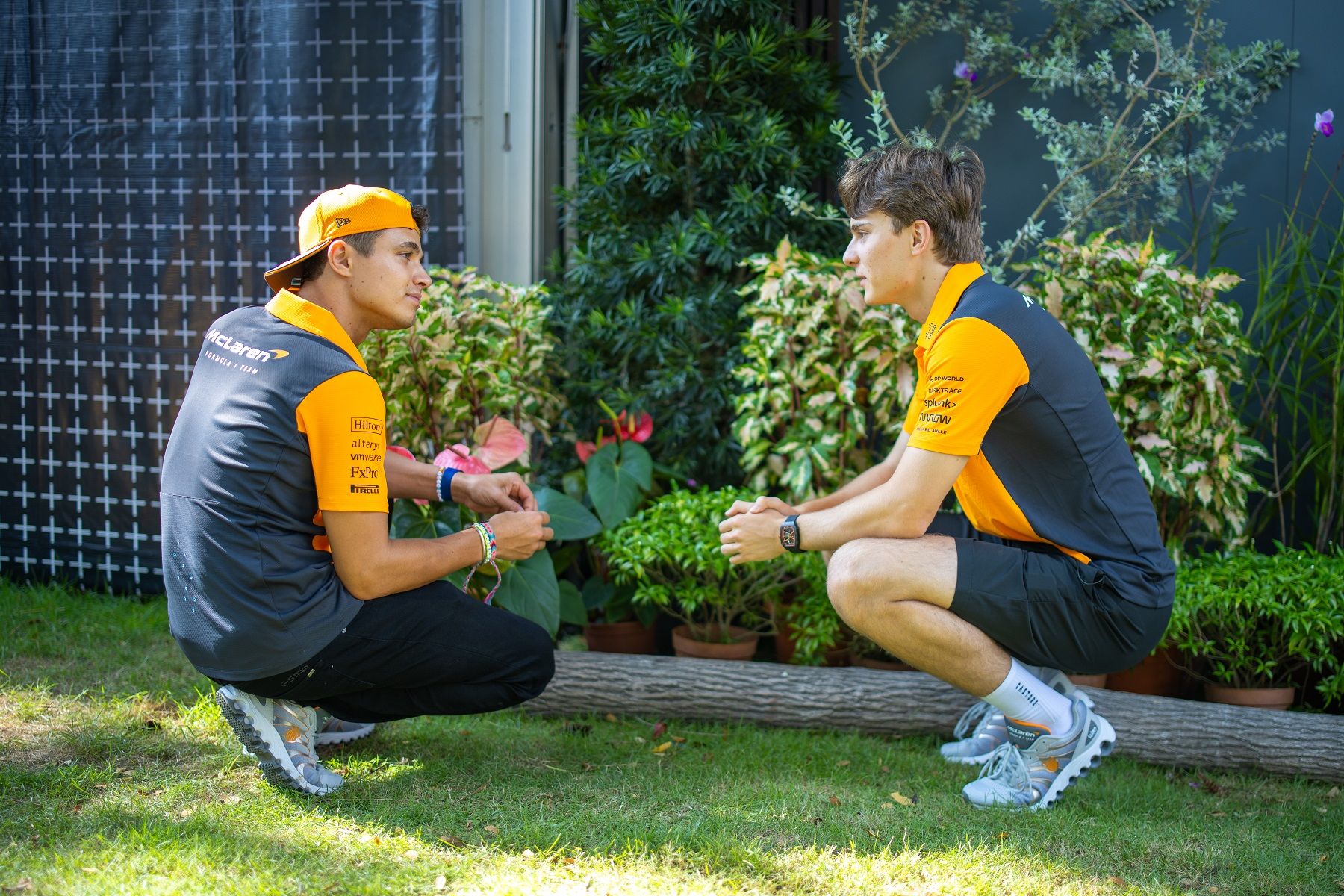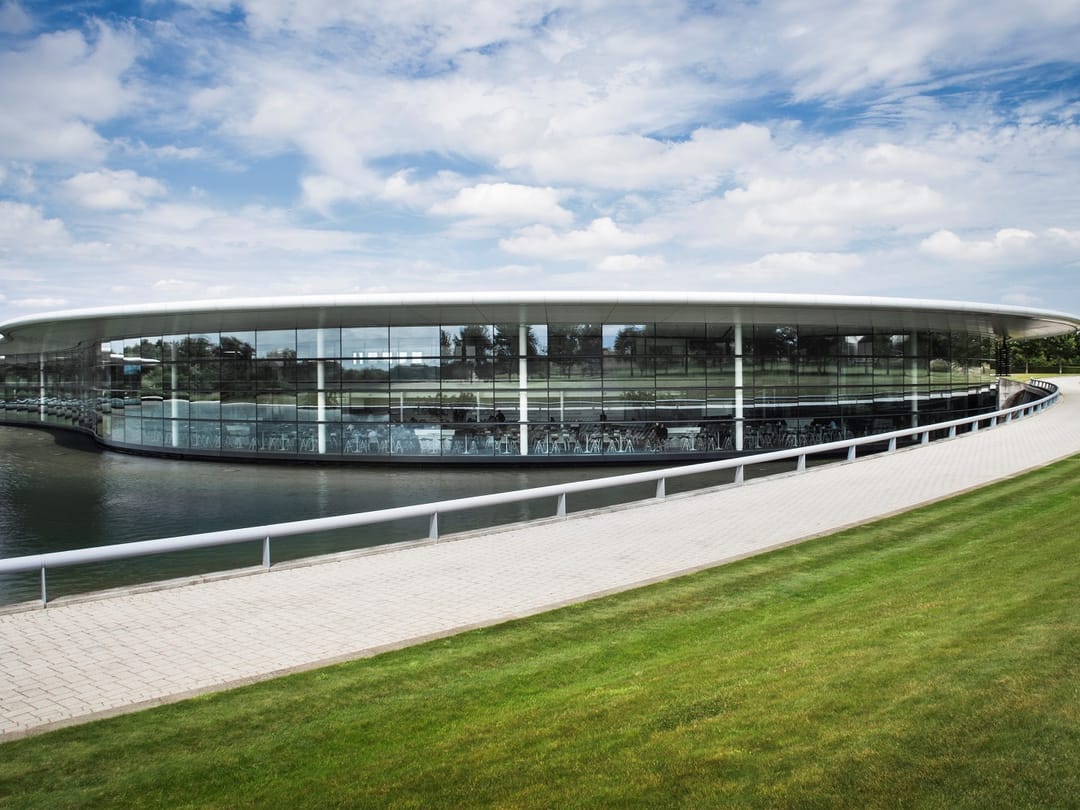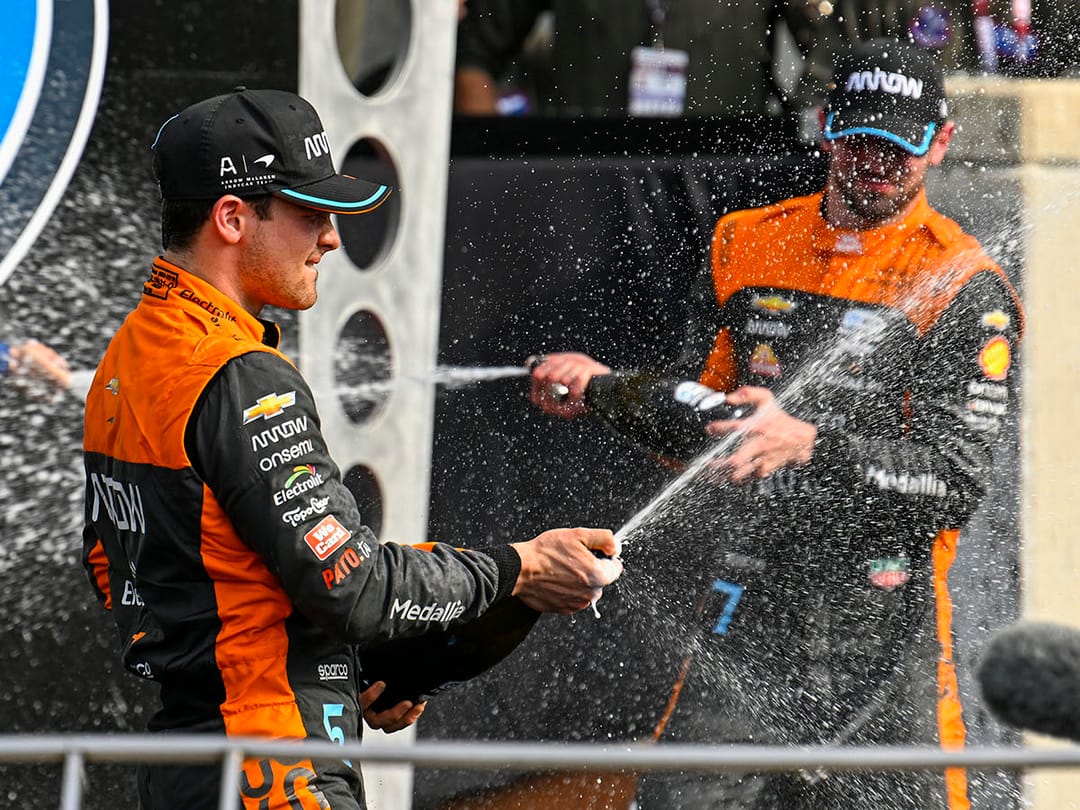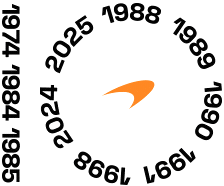
How our team handles pressure and manages their wellbeing
In support of World Mental Health Day, our staff explain how they prevent burnout
In motorsport, everything happens at such pace, but that doesn’t mean we shouldn’t take the time to stop, slow down for a second, and ask our colleagues if they’re okay.
Few, if any, sports can claim to be as pioneering as motor racing, famous for pushing the boundaries of what was previously thought to be possible, but that shouldn’t only apply to lap-times, pit-stops and technology, we should be pushing one another to talk more and open up.
Our staff hold highly pressurised, time-sensitive jobs that involve working long days and late nights in different countries worldwide. Finding healthy ways to handle the stress and demands of these jobs is unique to each individual, but it is up to the team to create an environment that allows for these coping mechanisms.
In support of World Mental Health Day 2023, we spoke with three people from different areas of our racing teams to learn about the pressures they face in their roles and how they and their teams manage them.

10 October is World Mental Health Day
Tom Stallard
Senior Principal, Race Engineer, McLaren Formula 1 Team
Since joining McLaren, Tom has worked as an engineer to Jenson Button, Stoffel Vandoorne, Carlos Sainz, Daniel Ricciardo, and currently, Oscar Piastri. Working with our team of experts and utilising their valuable input, Tom is responsible for executing Oscar’s race weekend.
“A big part of this is ensuring Oscar has what he needs to practice and mentally prepare for that performance”, he says.
Tom is also Head of Human Performance, focusing primarily on the race team. He’s worked to build a significant crew of in-house experts to support wellbeing, which includes a Head of Medical Services and Team Doctor, Team Physiotherapist, Team Psychiatrist, Team Psychologist and Team Nutritionist, to name just a few.

Tom (L) is Oscar's race engineer
Tom’s job is among the more prominent roles within Formula 1. Race engineers are placed under the microscope: their conversations with the drivers during sessions are broadcast around the world, and as such, a lot of what unfolds during a race is pinned at their door, even though decisions are taken by the team as a whole.
Discussing the pressures of his role, he says: “There is the acute pressure of performing on the day, critical decision making in uncertain situations with multiple inputs, and the intensity of racing. Being so directly involved in Oscar’s performance means I experience the highs and lows of competition very strongly. For me, this is also a big thrill of the job.”
These aren’t the only stresses Tom is faced with. As Oscar’s engineer, he attends every race of the season, spending large periods of time away from his family and his home whilst managing jetlag and travel fatigue, which he says, “creates a pressure of its own.” His ability to handle these challenges is why he’s so suited to the Head of Human Performance role.
“We wanted to create an environment where the team was supported as elite athletes, independent of their role”
Tom Stallard
Senior Principal, Race Engineer, McLaren F1 Team
“The biggest goal of the Human Performance team is to support a race team culture that is sustainable from a human perspective,” he explains. To maximise his team's performance, he must first manage his own mental health and wellbeing.
“For me personally, ensuring the team is a welcoming environment, who enjoy the social side of racing and working closely together, is a big motivator.
“The race team has always been close-knit, but Andrea [Stella] has fostered a culture where people are more empowered and trusted, and I believe this has created an environment that is less shackled by hierarchy. I find the power of effective teams really motivating.

Tom celebrating Oscar's first podium with the team
“Beyond that, I find running gives me headspace when I need it. F1 circuits are roughly 5k long with a smooth surface and interesting sights, so they also make great running tracks.”
A supportive culture, which puts people first, underpins our philosophy. The team have been educated on performance under pressure, mental health issues, sleep and fatigue strategies, and jetlag management. Our people also have access to team psychiatrist Dr Phil Hopley, Head of Medical Services Dr Justin Hughes, and more than 60 mental health first aiders.
“We wanted to create an environment where the team was supported as elite athletes, independent of their role. Where most fatigue management strategies rely on workload management, ours prioritises human performance with the aim of enabling the team to complete the required workload effectively and when needed.
“The addition of Team Physio, and other roles, mean travelling with the team is no longer detrimental for physical health, and knowing this supports mental health.”

From the factory to the track, it is vital that we create an enviroment that puts mental health first
Brendon Cleave
Lead, Damper Engineer, Arrow McLaren
Brendon ensures that the race engineers and mechanics have all of the equipment they require, overseeing the development and production of dampers, springs and suspension. In IndyCar, this area is among the few where development is permitted, making it a particularly vital performance differential. He also runs the pit-stop programme and the training, another highly demanding role.
“In my book, anything we do on a race car has a lot of pressure because you've got someone's life in your hands,” Brendon explains. “You’ve got a driver that's going out there fully committed, racing as fast they can possibly go, relying on what we've given them.”
IndyCar, like F1, is a sport of extremely fine margins, where an extra hundredth of a second during a pit-stop could be the difference between finishing first, third, or even further back. For that reason, it’s as competitive in the pit-lane as it is out on track.

Brendon oversees the development and production of dampers, springs and suspension
“It can get pretty, pretty crazy at times,” he continues. “I see the pressure on me as a privilege. People who rely on me to do my job, and vice-versa. That may make some people nervous or stressed, but it affects me in the opposite way. I want to be under that pressure, it drives my performance, and I enjoy it, although that doesn’t make it any easier.
“You have got to block everything out. You need a clear head. If you’re upset, worrying or if your mind is wandering off, then you will not be performing at a top level, and that is when you make mistakes. And mistakes in the pit-lane are usually pretty catastrophic.”
Apart from his love for the job and ability to thrive under pressure, how does Brendon cope with the weight of this on his shoulders?
“We focus on making sure you control what you can control, whether that is in car preparation, your own personal preparation or pit-stop practice”
Brendon Cleave
Lead, Damper Engineer, Arrow McLaren
“Training and preparation,” he says. “There are a lot of things at the race track you can’t control: maybe it is smoking hot and humid, and you’ve got a fire suit and helmet on, and you’re suffering. Or maybe your driver crashes and needs a fix in a short space of time. That is where your preparation comes in, you’ve got to be able to react quickly.
“This might be through sessions in the gym to make sure that you’re fit and healthy enough to endure three or four days in a row at a race track with long hours and poor sleep. We put a lot of focus on that so that you’re not lagging at the end of the weekend, you’re still fresh and ready to go. Everybody here has access to the gym 24/7, and we have a trainer. A healthy lifestyle and looking after yourself are important.
“We also focus on making sure you control what you can control, whether that is in car preparation, your own personal preparation or pit-stop practice. The race weekend should be the easy part. The race weekends are like the dessert. You’ve had your meat and potatoes and veg during the week, and you finally get your hands on dessert at the weekend. If it’s the other way around, you haven’t done your work beforehand.”

Brendon (front left) runs the pit-stop programme and the training
Louise McEwen
Executive Director, Brand & Marketing, McLaren Racing
While Brendon and Tom specialise in IndyCar or Formula 1, Louise works across all our racing teams. She is responsible for the narrative and strategy of the brand, while also overseeing the creative visual identity of the team’s entire racing portfolio.
This means that when we arrive at the racing circuit, we look our absolute best and are representing McLaren to the highest degree, whilst funding our race team through our partners.
“We work with fantastic global brands, and we need to make sure that we are representing them in the right way all of the time,” Louise says. “We work in a highly regulated environment - you can’t just stick something on the car wherever you like. It needs to perform from both a human and an aerodynamic point of view.”
We work in a dynamic sport where things can change very, very quickly with little to no notice. The team can often be working and communicating across at least two different countries and time zones, whether this be our American- and British-based teams, or our track- and factory-based teams.

Louise works across all our racing teams as Executive Director, Brand & Marketing
This means working unsociable hours where calls can come late at night, requiring the team to fix something, such as a branding issue, in real-time.
“Sometimes we have to get together and problem solve into the night, which can cause quite a bit of stress for people, but we get through it because we are world-class at doing that,” Louise says. “I know that as soon as my mental wellbeing starts to get affected, the wheels come off, and it comes out in all sorts of different ways - generally a lack of patience, so I try to preserve some time in the week for my mental health.
“Some of that is having time to walk my dogs and listen to podcasts, which works for me. I go to the gym a couple of times a week as it is really important to me to keep my fitness up. If I am fitter, I can endure the hours I'm working and the travel we're doing.
“This is a high-performance team, and when things go wrong, we pull together. There is a no-blame culture, but we take accountability”
Louise McEwan
Executive Director, Brand & Marketing, McLaren Racing
Of the three people we spoke to, Louise, as an Executive Director, is responsible for managing the largest number of people. And it isn’t only her instructions that impact the team, but her actions too. If the team can see that she is managing her own wellbeing and taking time for herself, then they will feel more comfortable doing the same for themselves.
“Generally, when the wheels come off, it's probably because I haven't done a couple of those things. It can be hard, but I know that by carving the time out, I'm more effective after I've done it.
“That, and actually, also just feeling good about yourself. If I get home from a busy day and my head is fried, I like finding the time to cook something from scratch. Nothing fancy, but cooking a meal with nutritional value versus something from the freezer makes me feel better because I'm taking that time to do something for me and my wellbeing.”
“I think that my team, particularly the creative team, are really good advocates for this, and I admire them because they have got into a great routine where they down tools at lunchtime and go out for a walk collectively around the factory grounds.”

Louise celebrates out British Grand Prix podium with the team
But, not everything can go right 100% of the time, and that is when these processes come under the most scrutiny. It’s easy to manage your wellbeing when things are going well, but what about when they aren’t? Issues will occur that couldn’t have been accounted for, and mistakes will be made.
“The clue is in the title: we are a team,” she says. “This is a high-performance team, and when things go wrong, we pull together. There is a no-blame culture, but we take accountability, and then we all muck in to resolve things together. That takes the mental load off any one individual.
“We are a tight-knit team who work together and support one another. We share the high pressure, and we talk a lot. Communication is key, which is why people go above and beyond.”
If you are distressed and feeling that you're in crisis, call 999 or visit A&E if you’re at risk of harming yourself, or somebody else, or if you’re feeling suicidal. If you’re unsure if you need to go to A&E, you can also call 111 for support and guidance. You can also speak to the Samaritans, who offer free and confidential support to people in distress 24/7 by calling 116 123.




An honest conversation with Lando
Sit down with Lando and have an honest conversation about mental health
The key takeaways from our Sustainability Report
Your five need-to-knows from our second report
Debriefing Arrow McLAREN’s 2023 Season
“We’re going to come back next year even stronger and race hard for wins”
How F1 in Schools is introducing the next generation to motorsport
McLaren has supported the Aramco F1 in Schools’ Research and Development award for 15 years
Sign up now
McLaren Plus is our free-to-join fan loyalty programme, bringing McLaren fans closer to the team with the most inclusive, rewarding and open-to-all fan programmes in motorsport.
Sign up now, or current members can amend their details in the form below if necessary.



